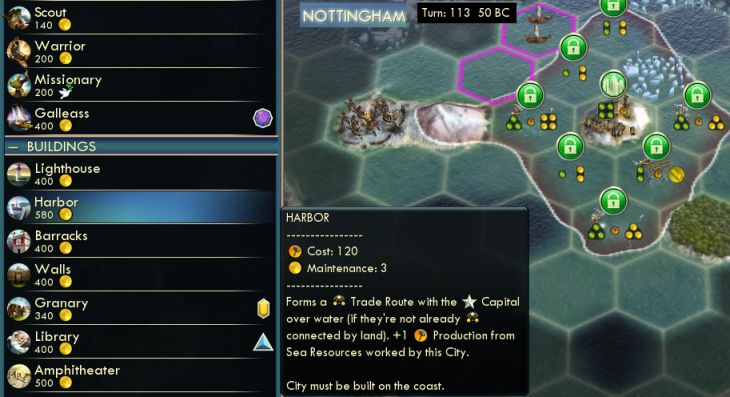
I'd continued research up to Compass, and bought a harbor. That's a cost of 580g for 120h, which isn't too efficient - but the turn-economy makes it drastically so. Buying the harbor means an additional 5 hammers of production over 20 turns of not slow-building the harbor. Add the turn economy of gold income from the trade route and this becomes very efficient indeed. The net was something like 480 gold for 220 hammers. More generally, this is the thing to look for with purchases - items that pay back greatly in turn economy. (As so often happens with anything I analyze, Alpha Centauri was the king of this effect, where bought terraformers or colony pods could pay back their purchase cost in ten turns or less.)
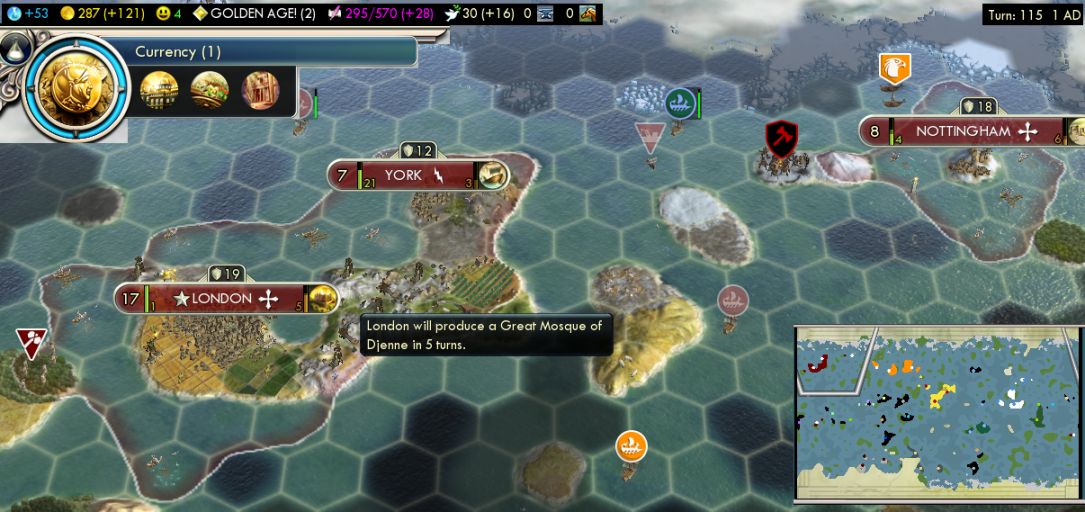
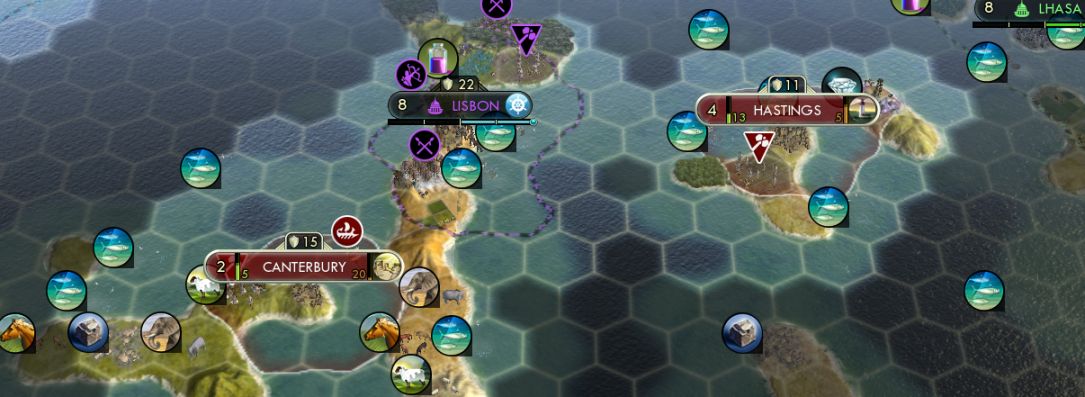
By 1 AD, I had five cities total, with two southerly claiming luxuries and other resources. I bid for the Great Mosque in London, but lost it by a few turns. London had first slow-built its harbor - I would have had this wonder if my bought harbor had been here instead! That retarded my evangelism plans a fair bit - the next missionary was supposed to have three spreads to York, Hastings, and Canterbury, and then the newer two cities would get Pagodas. I was trying to use religion like in Civ 4, as a way to get culture going in new cities, but that does take quite a while to first spread and then save up again for the pagoda.
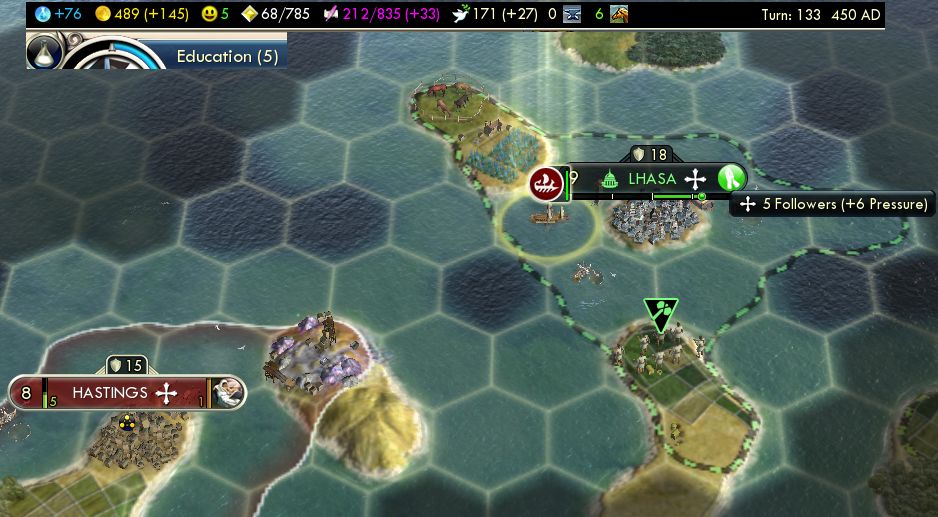
So I ended up buying one more missionary than planned, who used one of his spreads here. Both because Lhasa had quested me to spread them Christianity, but also because now it and Hastings would mutually pressure more followers into each other. A city generates no pressure onto itself - the number of followers does not grow on its own - only by pressure from nearby cities. (A holy city does pressure itself, and a newly grown population always follows the city's majority religion, so these cases make it appear that followers autonomically grow, but only these cases.)

BTW, the best way to accumulate faith is the same as everything else: rent it from city-states. No need to spend scarce hammers or the opportunity cost of a faith-generating belief. Just make a few CS happy and you'll get plenty.
London now produced a Great Merchant from the GL and Colossus. Great Merchants are always rather underwhelming in Civ 5. All great tile improvements are rather blah until you finish Freedom, which I wouldn't be doing here. Golden Ages in G&K were made the exclusive property of the Great Artist. So that left a trade mission as the only thing to do with him, which won 90 influence after spending the 500 gold right back on more influence. Moderately effective at best, and less exciting.
In the social policy department, I'd finished Tradition and now started into Commerce, with the opener adding 16 gold/turn. Unfortunately, the policies weren't really coming in quickly. Naval Tradition would surely be useful, but I wouldn't get to Merchant Navy (+3 hammers) or Mercantilism (-25% purchase cost) in much time to be useful.
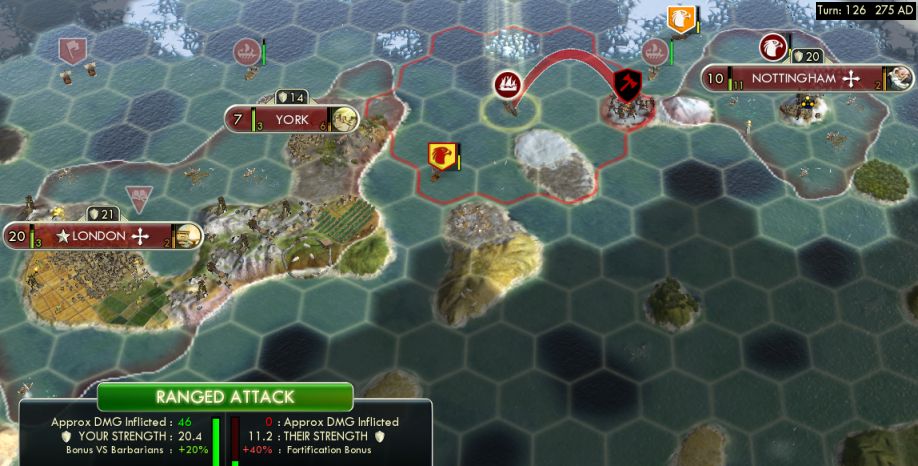
A while after Compass, I finally built a Galleass unit, and used it to take care of this nuisance. (The scout in Nottingham would go disperse the empty camp after the boat killed the warrior.) The Galleass is the first of the promised ranged naval units in Gods & Kings. I had been mildly shocked at the potential of the unit, at a huge 17 ranged strength this early on the tech tree. But I'm used to Civ 4 strength values; in fact it's only a bit stronger than a trireme. So if Galleasses wouldn't conquer the world singlehandedly, I decided to keep developing and hold out for Ships of the Line, which is what an authentic England should be doing anyway.
But that Navigation tech wasn't far off - originally about 40 turns after Compass, which came down to about 25 after London's University. So I started bending my nation towards future Ship of the Line production, writing off stuff like markets and libraries, and instead going with barracks (which oddly work on naval units), workshops, and the Heroic Epic.
Workshops are worth a brief note here: although they typically take 30-40 turns to pay off and my time horizon is shorter than that, they were worthwhile here. They have the effect of shifting production from now into the future, when the hammers can gain greater leverage by being applied to a better item. I give up no hammers worth of SoLs now to receive +2 and +10% hammers worth of SoLs in the future. Also, the engineer slot helps significantly - these seafood-bloated cities could easily spare an engineer from the fish fields.
My second Great Prophet now came. Actually I couldn't avert that - because the cost for missionaries and pagodas rose to 300, I couldn't even spend the faith ahead of the Great Prophet spawning also at 300. Anyway, he enhanced the religion, picking up Guruship (+2 hammers if city has a specialist, making those engineers essentially worth 4 hammers) and for the enhancer belief I added Just War (+20% combat near enemy cities of your religion), thinking to send missionaries along with the offensive armada.
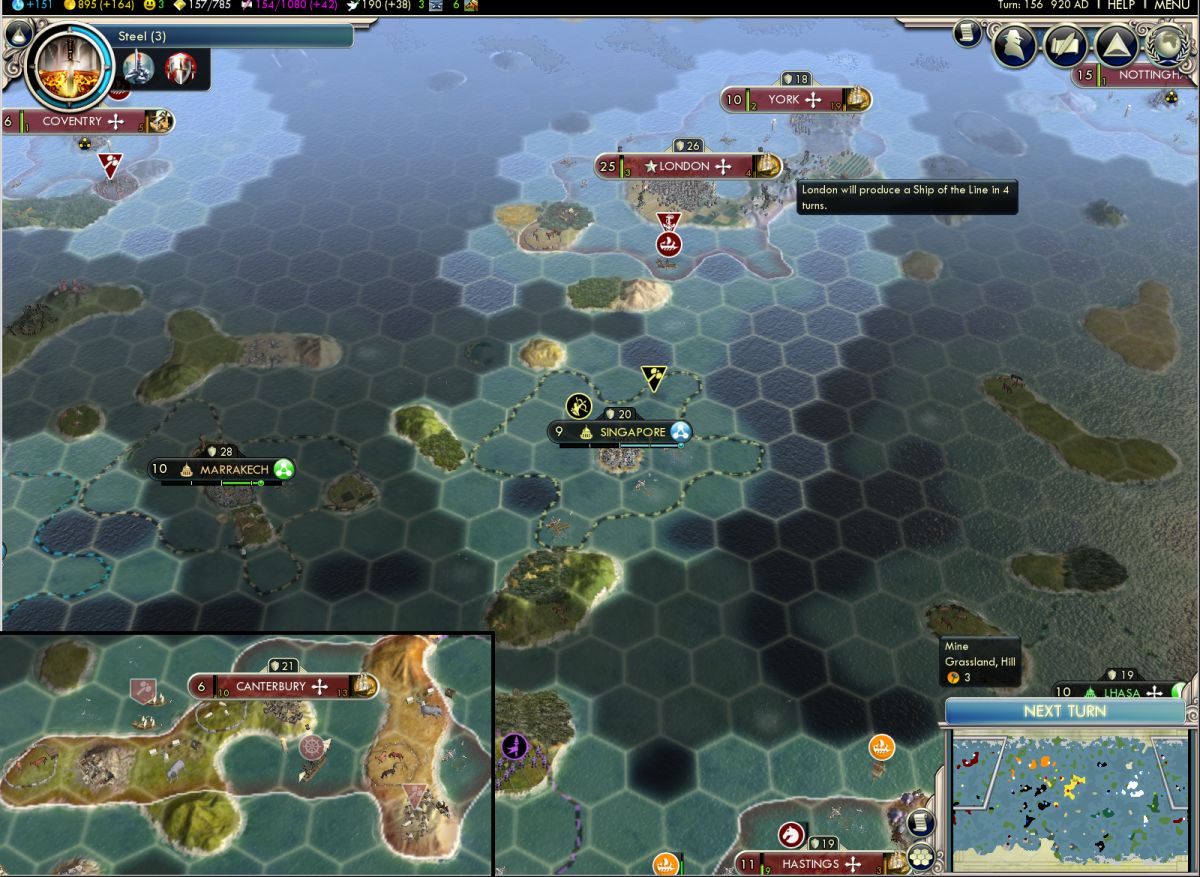
Skipping over a few centuries, here's a look as the Ships of the Line start rolling off the, err, line. They require Iron, which need was taken care of with a 1000 gold gift to Geneva which had a 6-iron source.
Canterbury worked out rather poorly - it has four fish, but all in third ring, so took forever to expand to them and start growing. I did not know this, but apparently cities like to acquire all the blank ocean tiles at 2 distance before any sea resources at 3 distance. That is irritating and nonsensical. Coventry did better, founded to pick up a salt resource with two fish in second-ring.
That shot also shows my massive cash income, 160/turn. I hadn't expected that, but London exploded into a massive cash producer, with the Colossus and Monarchy and the Commerce opener all multiplying together. I'd pumped that cash mostly into city-states, now owning a wide stable of maritime and mercantile and religious providers. As always, selling luxuries and buying city-states is the right thing to do. A lux sale buys a CS which replaces that luxury, plus the CS benefits. As a bonus, it is good to sell your own resources for purposes of We Love The King Day. Cities will often demand a resource that you actually own and are just temporarily trading away, so it's easy to just wait a few turns and get a free WLTKD. That's greatly preferable to when a city gets stuck demanding a WLTKD resource that you can never actually acquire at all.
Anyway, that cash now bought London's Seaport. 1000 gold for 250 hammers, but also the turn-advantage of producing 6 hpt from its 6 sea resource, plus another 7 hammers from the 15% on naval units, plus the building added 6 +50% gold per turn to defray the cost. Again an efficient purchase by way of turn economy.

Those are some ridiculously massive sea tiles.